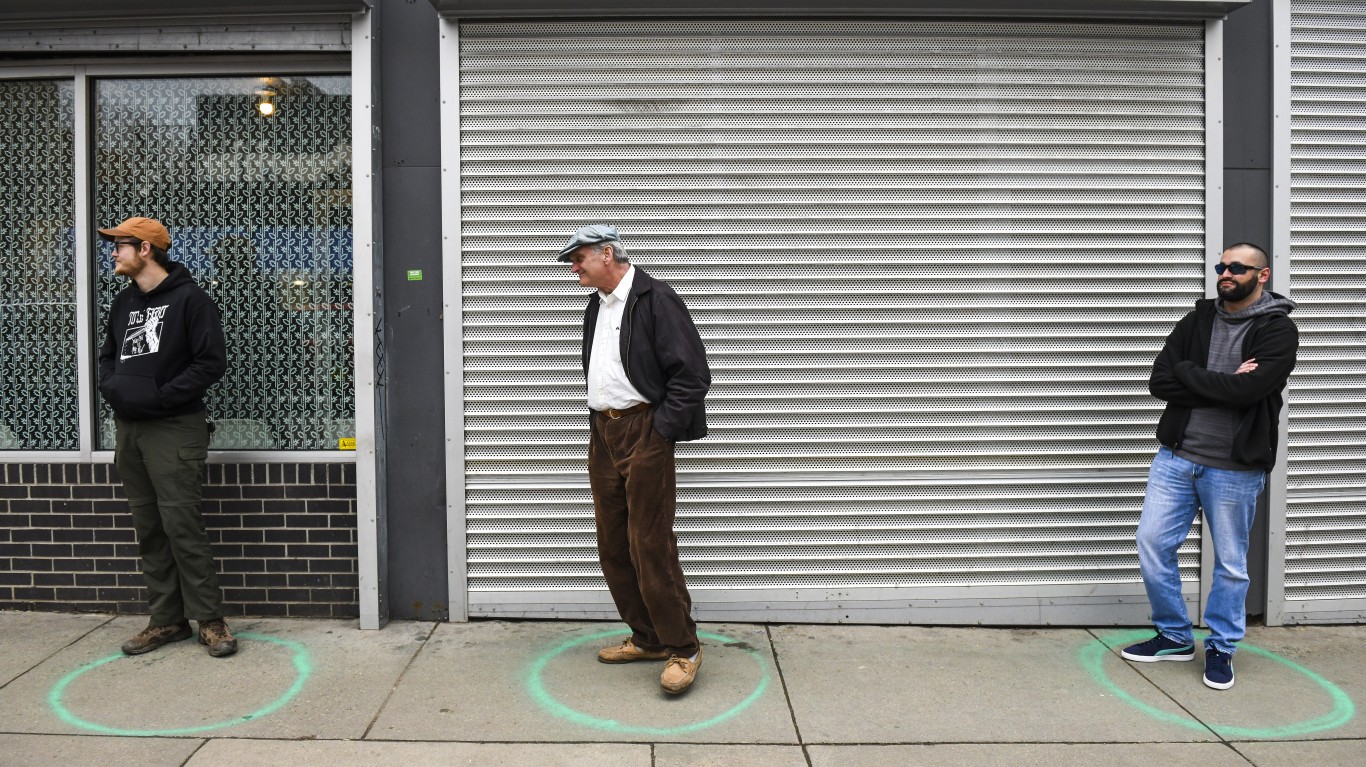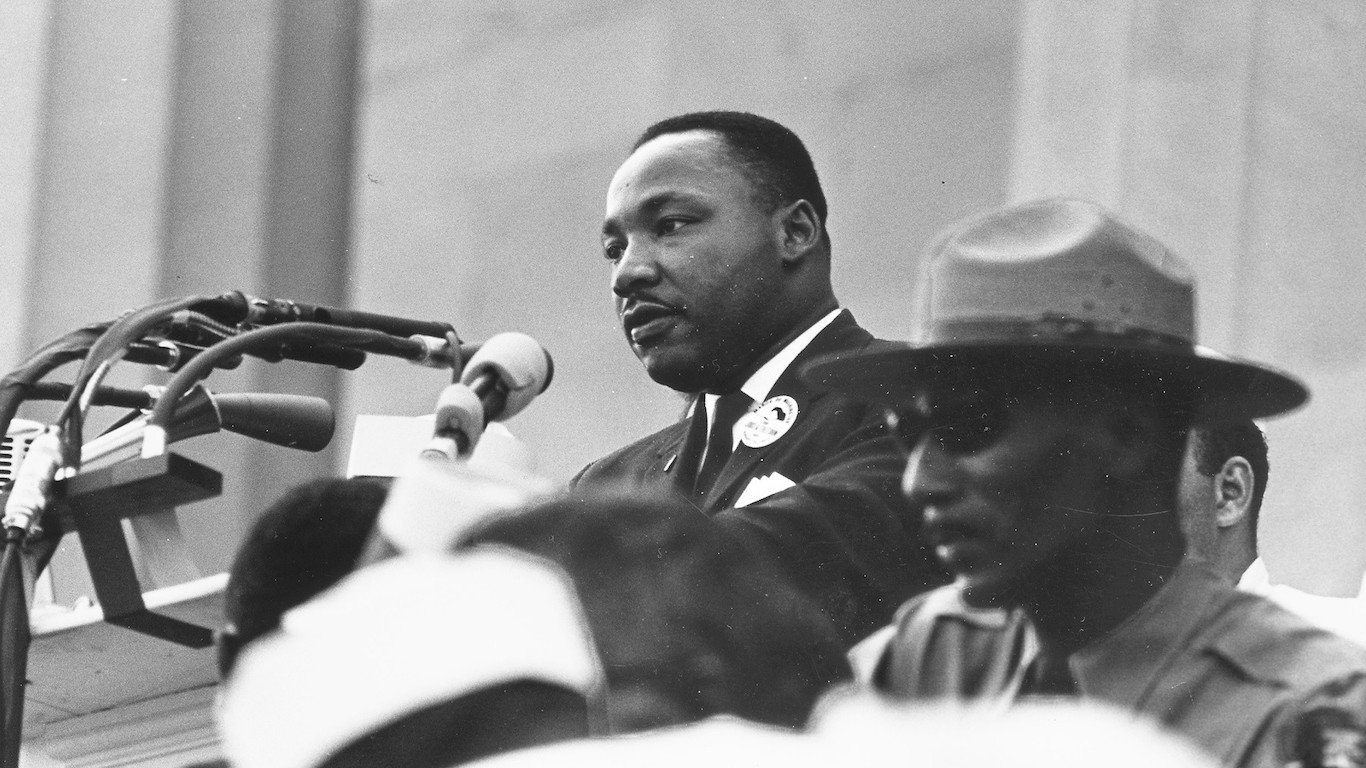

The U.S. reported over 1,026,000 new cases of coronavirus over the seven days ending September 21, bringing the total count to more than 41.8 million confirmed cases of COVID-19. There have been more than 669,000 COVID-19-related deaths — the highest death toll of any country.
New cases continue to rise at a steady rate. In the past week, there were an average of 47.3 daily new coronavirus cases per 100,000 Americans — essentially unchanged from the week prior, when there were an average of 48.1 daily new coronavirus cases per 100,000 people.
While new data shows that the risk of contracting COVID-19 is high in almost every part of the country, cities continue to be the sites of major outbreaks and superspreader events. Experts agree that the virus is more likely to spread in group settings where large numbers of people routinely have close contact with one another, such as colleges, nursing homes, bars, and restaurants. Metropolitan areas with a high degree of connectivity between different neighborhoods and a large population may be particularly at-risk.
The Decatur, AL metro area consists of Morgan County and Lawrence County. As of September 21, there were 15,401.5 confirmed cases of COVID-19 per 100,000 Decatur residents, 18.9% higher than the national rate. For comparison, the U.S. has so far reported 12,954.8 cases per 100,000 Americans nationwide.
The incidence of coronavirus cases depends on a variety of factors and can vary even between neighboring counties. Within the Decatur metro area, Morgan County has the highest incidence of COVID-19 cases. As of September 21, there were 16,267.5 cases per 100,000 residents in Morgan County, the most of any county in Decatur, and far greater than the county with the lowest incidence. In Lawrence County, there were 12,278.4 cases per 100,000 residents — the least of any county in Decatur.
In order to slow the spread of COVID-19, city and county governments have ordered the closure of thousands of consumer-facing businesses. These measures have led to widespread job loss and record unemployment. In the Decatur metro area, unemployment peaked at 12.0% in April 2020. As of May 2021, the metro area’s unemployment rate was 2.6%.
To determine how the incidence of COVID-19 in the Decatur, AL metro area compares to the rest of the country, 24/7 Wall St. compiled and reviewed data from state and local health departments. We ranked metro areas based on the number of confirmed COVID-19 cases per 100,000 residents.To estimate the incidence of COVID-19 at the metropolitan level, we aggregated data from the county level using boundary definitions from the U.S. Census Bureau. Population data used to adjust case and death totals came from the U.S. Census Bureau’s 2019 American Community Survey and are five-year estimates. Unemployment data is from the Bureau of Labor Statistics and is seasonally adjusted.
| FIPS | MSA | Population | Confirmed COVID-19 cases as of September 21 | Confirmed COVID-19 cases as of September 21 per 100,000 residents | Cumulative COVID-19 deaths as of September 21 | Cumulative COVID-19 deaths as of September 21 per 100,000 residents |
|---|---|---|---|---|---|---|
| 12220 | Auburn-Opelika, AL | 161,152 | 21,977 | 13,637.4 | 204 | 126.6 |
| 26620 | Huntsville, AL | 457,003 | 62,770 | 13,735.1 | 769 | 168.3 |
| 22520 | Florence-Muscle Shoals, AL | 147,327 | 21,527 | 14,611.7 | 441 | 299.3 |
| 19460 | Decatur, AL | 152,271 | 23,452 | 15,401.5 | 420 | 275.8 |
| 33860 | Montgomery, AL | 373,544 | 57,897 | 15,499.4 | 1,092 | 292.3 |
| 20020 | Dothan, AL | 148,252 | 23,419 | 15,796.8 | 515 | 347.4 |
| 46220 | Tuscaloosa, AL | 250,681 | 40,180 | 16,028.3 | 703 | 280.4 |
| 13820 | Birmingham-Hoover, AL | 1,085,330 | 179,573 | 16,545.5 | 2,653 | 244.4 |
| 19300 | Daphne-Fairhope-Foley, AL | 212,830 | 35,750 | 16,797.4 | 452 | 212.4 |
| 33660 | Mobile, AL | 430,655 | 72,518 | 16,839.0 | 1,225 | 284.5 |
| 11500 | Anniston-Oxford, AL | 114,618 | 20,269 | 17,684.0 | 377 | 328.9 |
| 23460 | Gadsden, AL | 102,748 | 18,636 | 18,137.6 | 433 | 421.4 |
Sponsored: Want to Retire Early? Here’s a Great First Step
Want retirement to come a few years earlier than you’d planned? Or are you ready to retire now, but want an extra set of eyes on your finances?
Now you can speak with up to 3 financial experts in your area for FREE. By simply clicking here you can begin to match with financial professionals who can help you build your plan to retire early. And the best part? The first conversation with them is free.
Click here to match with up to 3 financial pros who would be excited to help you make financial decisions.
Thank you for reading! Have some feedback for us?
Contact the 24/7 Wall St. editorial team.



